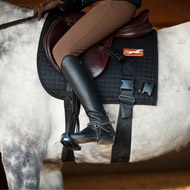
Bands can be used to treat and prevent equine injuries
New research led by the RVC has found that elastic resistance bands are very effective in increasing dynamic stability of the horse in trot.
Up to now, there has been little supporting evidence on the effect of training or rehabilitation programmes in preventing or treating lameness and back problems in horses.
But this new study proves that elastic resistance bands can be used to prevent equine injuries, as well as overcome them.
In the study, researchers employed seven privately-owned horses to undergo a four-week exercise programme. They attached two elastic bands to a modified saddle pad using buckle clips. The bands were fitted at a tension 30 per cent tension.
The team then used a statistical model to assess the effect of band usage, investigate the effect of time and examine whether the horse moved in-hand or on the left of right turn on the lunge. They calculated the back movement parameters from a total of 3,215 strides at week one and at week four, with and without exercise bands.
Riders reported a ‘greater stability of movement’ when the elastic bands were used. This was backed by the study, which found that when using bands there was less roll and pitch in the lower back. There was also less left-right movement in the mid-thoracic and lumbar regions.
“The system, we tested is easy to use during the normal exercise routine of a horse, meaning it can be applied to horses of any discipline,” explained lead researcher Dr Thilo Pfau, senior lecturer in bio-engineering at the RVC. “It also takes very little time to apply to the horse, considering all it entails is attaching the bands to a modified saddle pad, and it can be used during ridden exercise.”
The team are now encouraging future studies to directly measure muscle activity to increase understanding of the underlying mechanisms involved in providing increased dynamic stability.
Image (C) RVC



 BSAVA is to partner with BVA Live (11-12 June 2026) to champion clinical research.
BSAVA is to partner with BVA Live (11-12 June 2026) to champion clinical research.